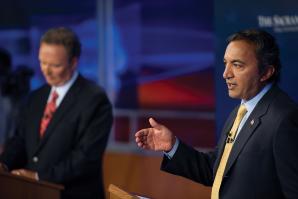Taxes are en vogue these days, and not just at the state level where Gov. Jerry Brown is pushing a sales and income tax ballot measure. Eight California cities already gained general tax increases from their residents in the June elections; several more cities and counties will attempt to follow suit in November.
Among them are Davis with a school parcel tax, Truckee with a park bond measure, and Citrus Heights with an increase in utility user taxes. Now, Sacramento is joining the trend with a November ballot measure to increase the city’s sales tax by half a percent to fund general operations such as police, firefighters and parks.
Raising taxes while we have double-digit unemployment and a weak economy is a big mistake. It carries the risk of dampening already-weak consumer spending and endangering shaky small businesses.
Especially worrisome, the proposal means Sacramento would tie Galt for the highest tax rate in the region.
Why would any business owner choose to locate in Sacramento rather than surrounding communities when it means cutting profits? Any new tax will put Sacramento businesses at a significant competitive disadvantage against neighboring cities.
I’m especially concerned about the impact of higher taxes on downtown development. Take, for example, the recent purchase of the Downtown Plaza by JMA Ventures. A new owner has long been considered an essential part of the years-long effort to revitalize downtown.
We are poised to send exactly the wrong message if we pass taxes that make it more costly for the new owner to operate the mall. In essence, we are discouraging both retailers and shoppers from doing business in Sacramento.
Yes, I understand why Sacramento and other cities are asking residents to dig deep and approve tax increases. In Sacramento’s case, the recession has led to a drastic drop in tax revenue, down to 2005 levels. In dealing with its financial dilemma, Sacramento has made deep and painful cuts in police and fire protection, parks and recreation, libraries and social services.
It has tried to deal with rising employee costs by negotiating with major public employee unions to make contributions toward pensions.
But new taxes are not the answer. They simply allow the city to avoid exploring more innovative ways to streamline government, including privatization of some city services and still further reductions in employee costs. In addition, new tax dollars are almost always committed to long-term programs, making it difficult to scale back even when the economy recovers.
The answer is in making the Capital Region more business-friendly by reducing costs, not increasing them. We need public and private sectors to work together collaboratively to reduce barriers to business investment.
Sacramento has the potential to build a robust local economy and act as an important catalyst for regional economic revitalization and job growth. But that will only happen once public leaders join forces with the private sector to make the city much more attractive to business investment. It will certainly not happen by enacting even higher taxes that undercut the city’s potential.
Recommended For You

GOP on Deck
Can the Republican contenders overcome Brown in 2014?
With just over a year until the midterm elections, California’s next gubernatorial race is starting to take shape.

Is Sacramento Permanently Democratic?
Voter trends with lasting effects
The 2012 election may have spelled the end for a 30-year boomlet of Republican legislative and congressional representation in Sacramento.


